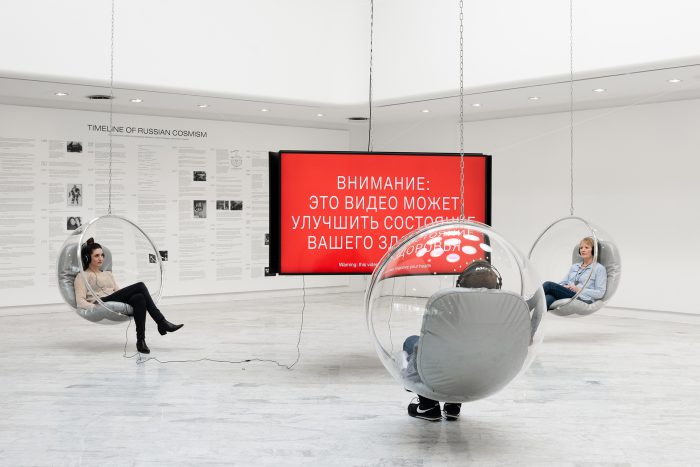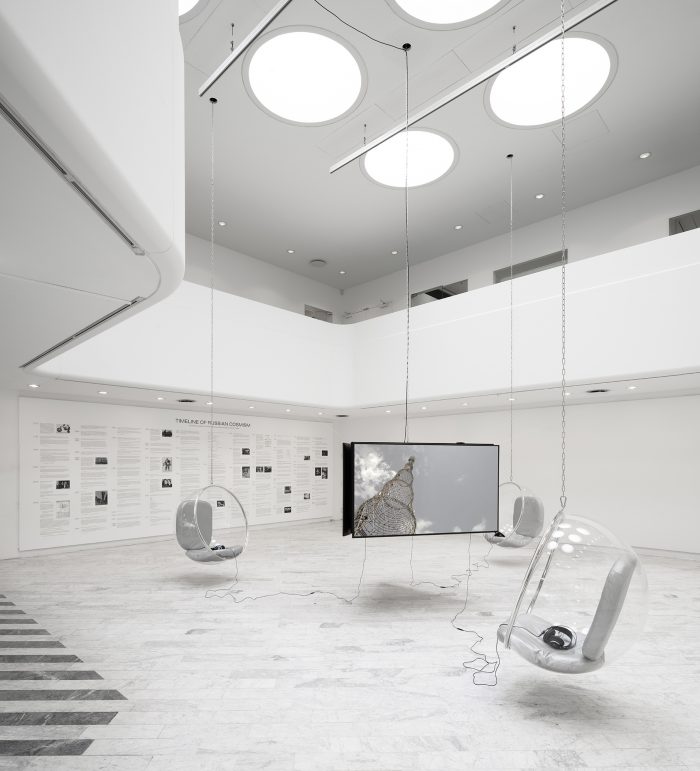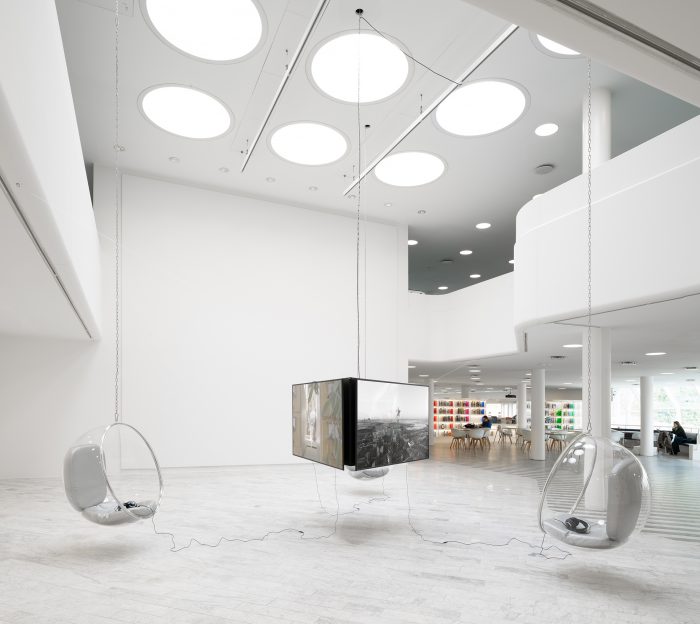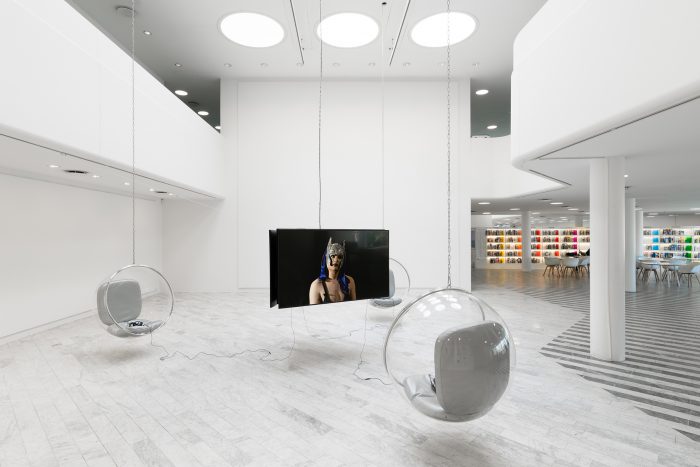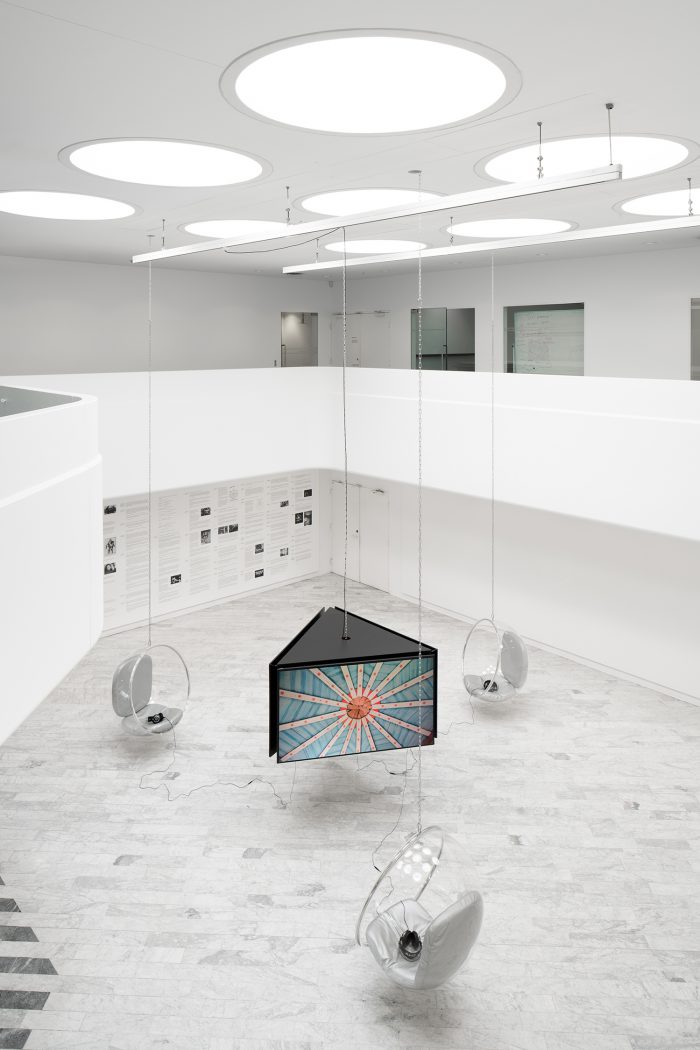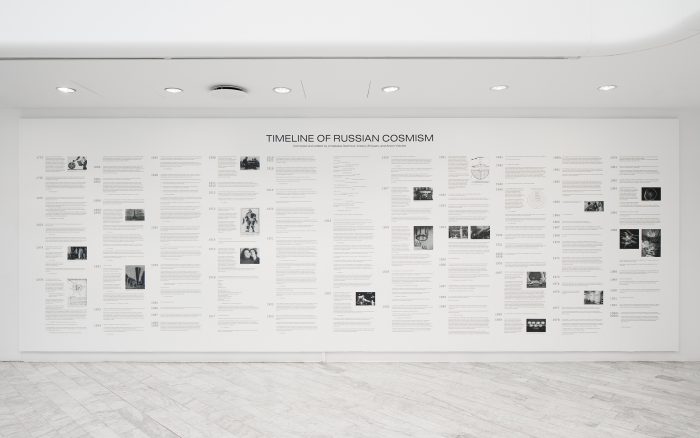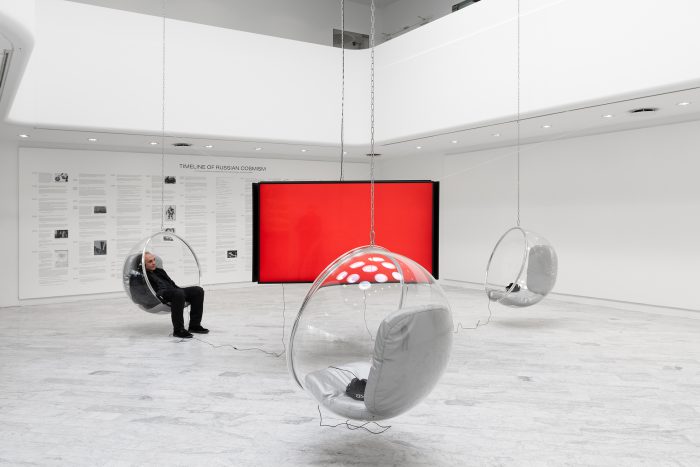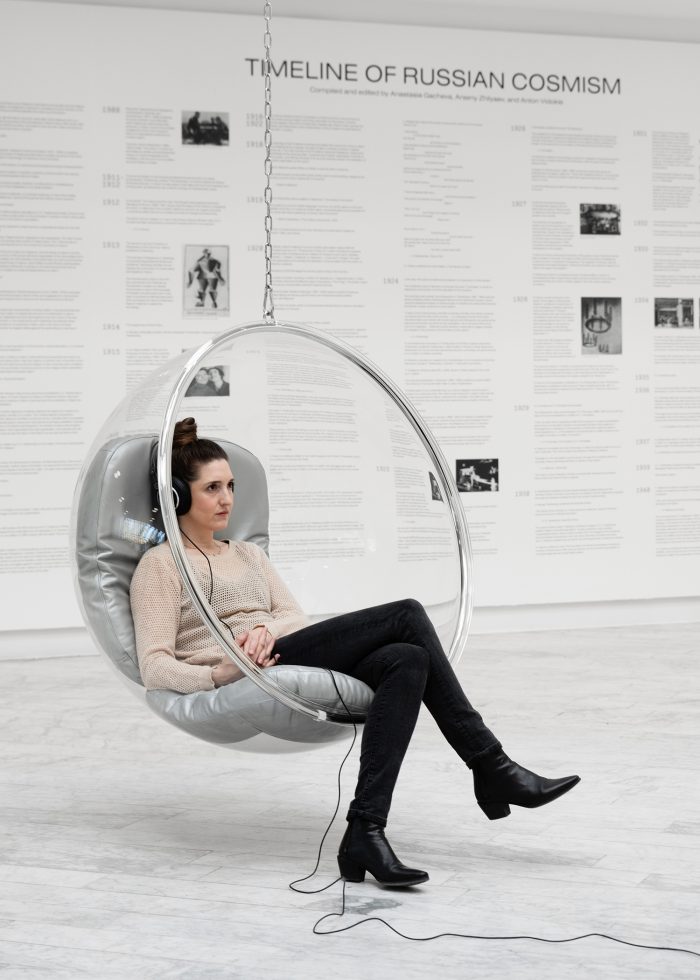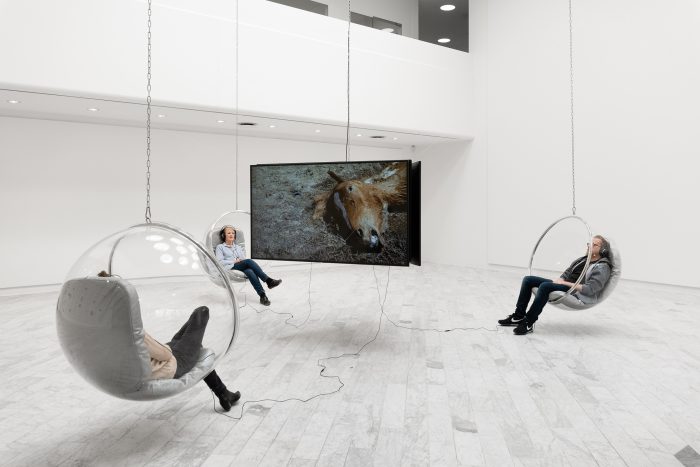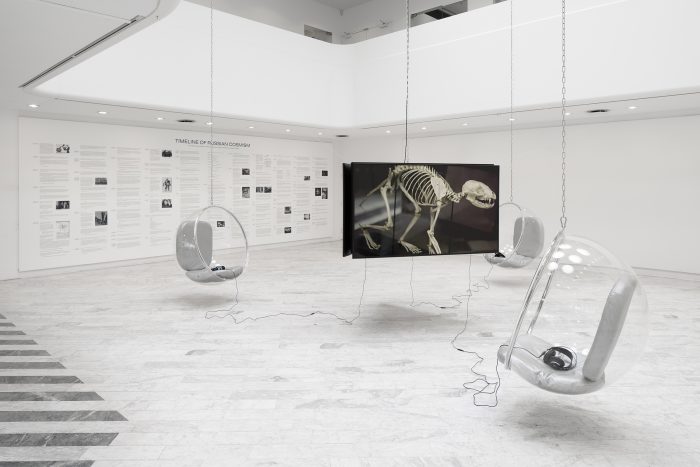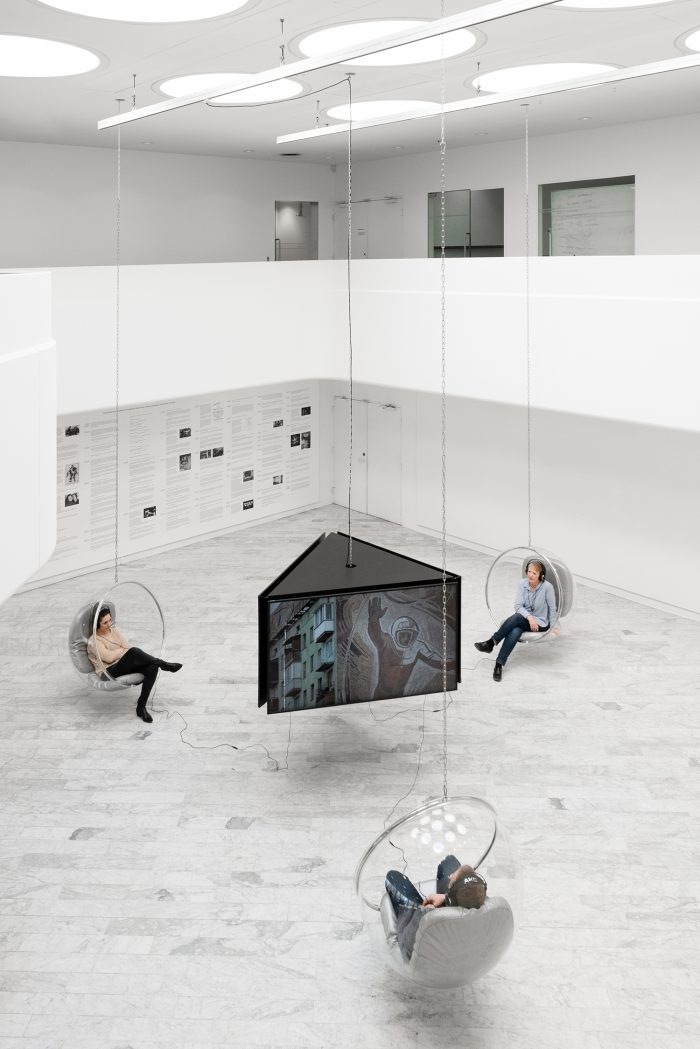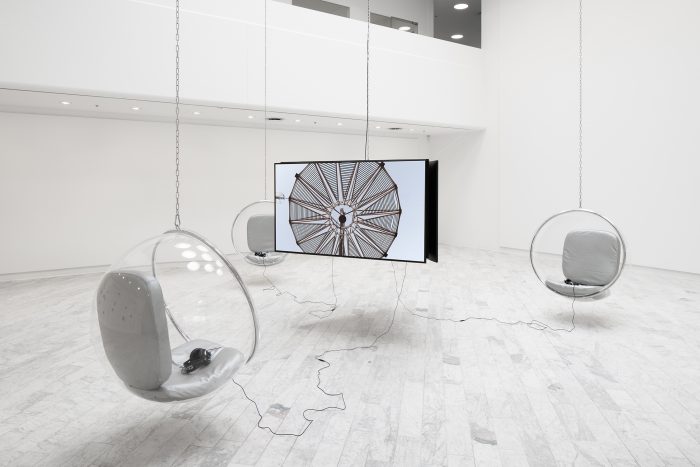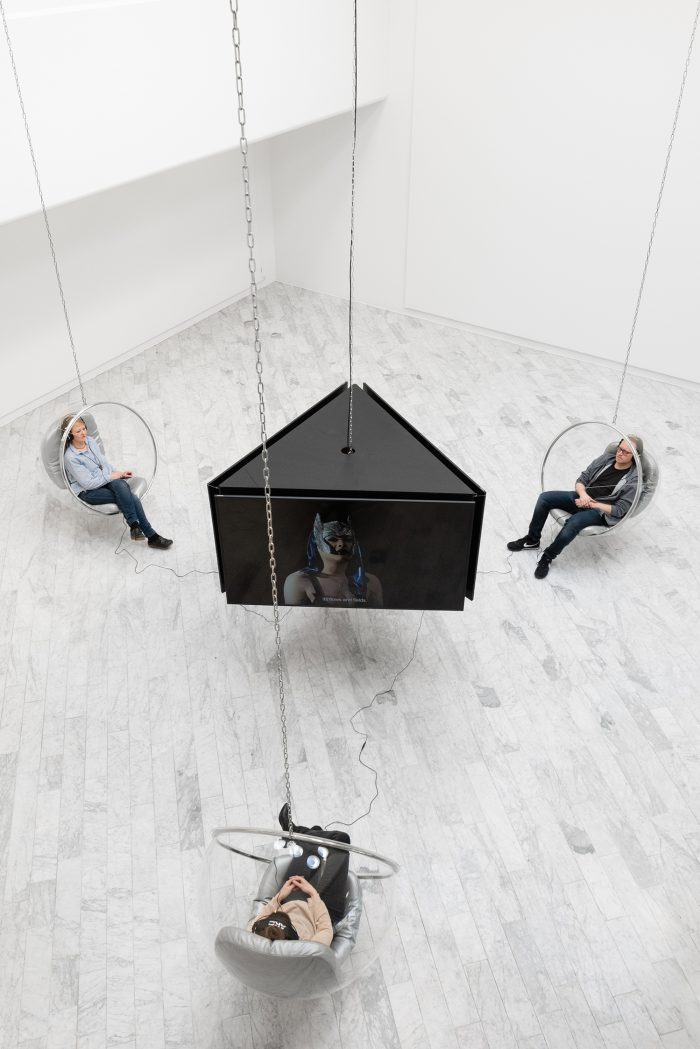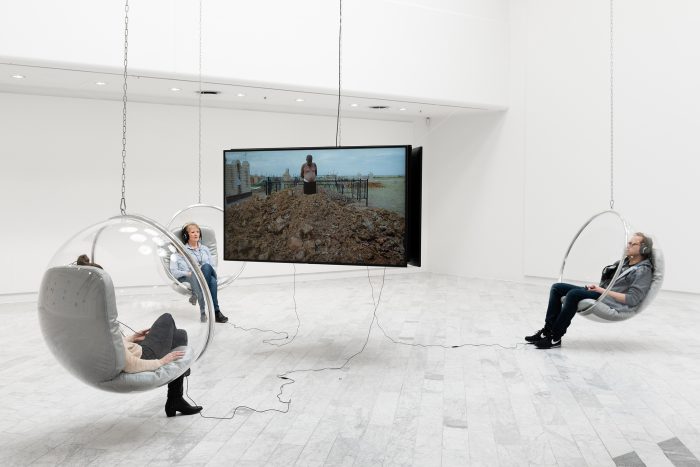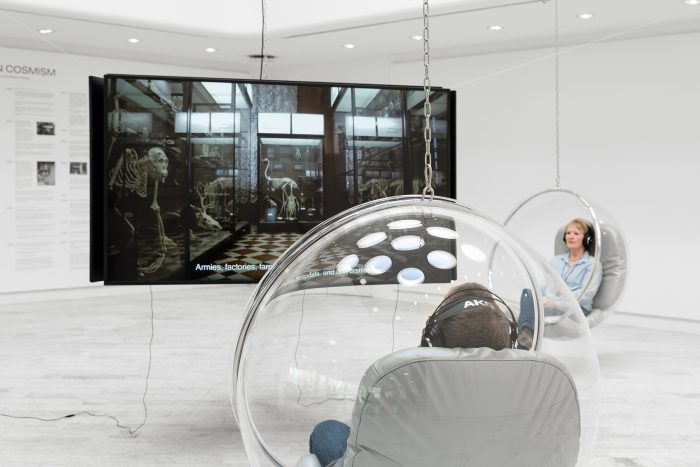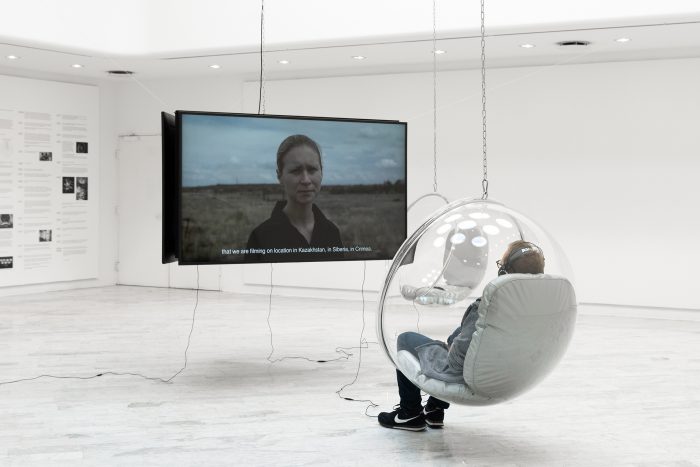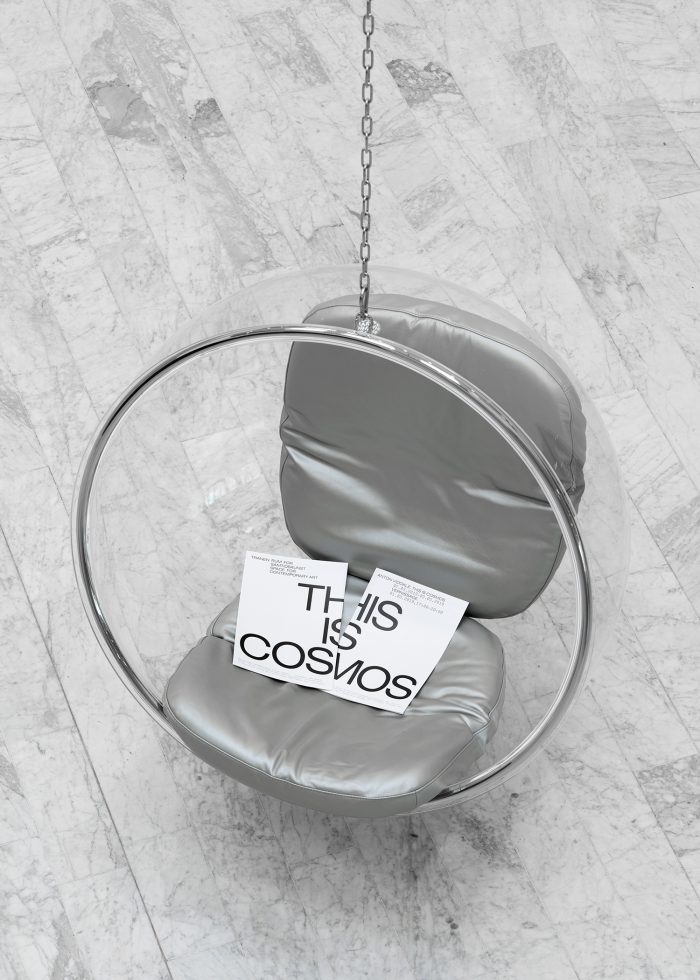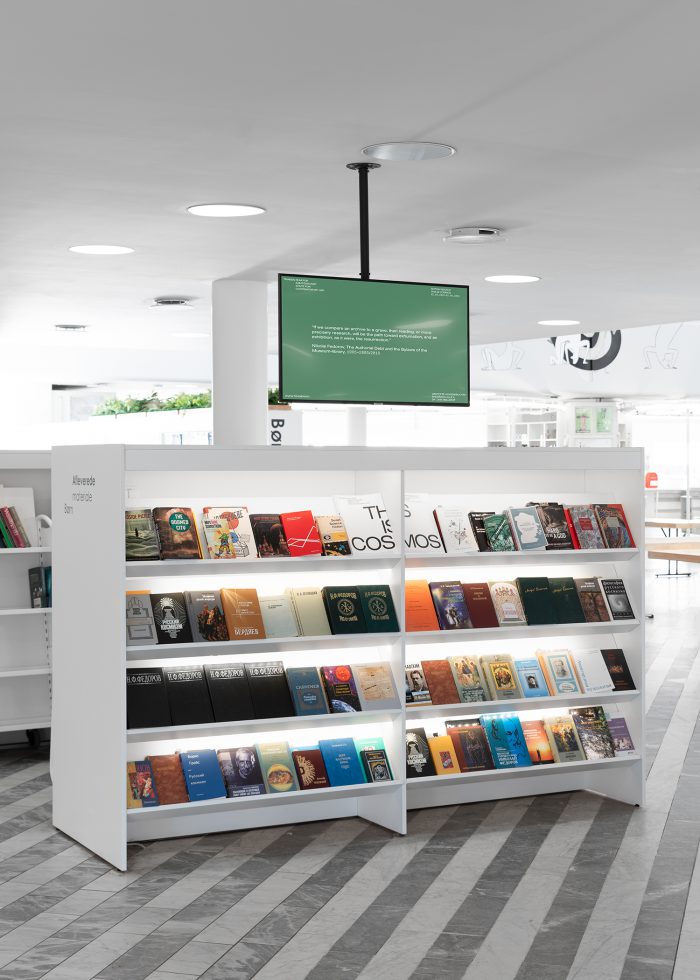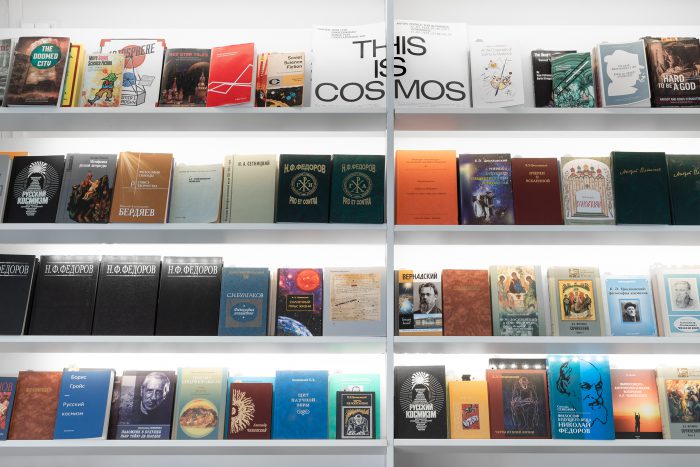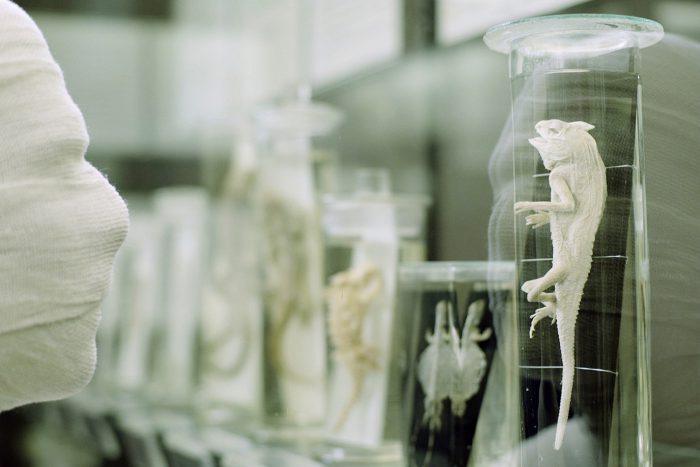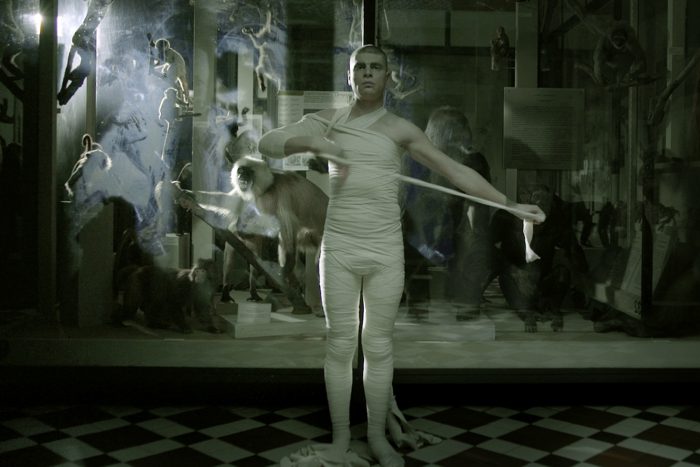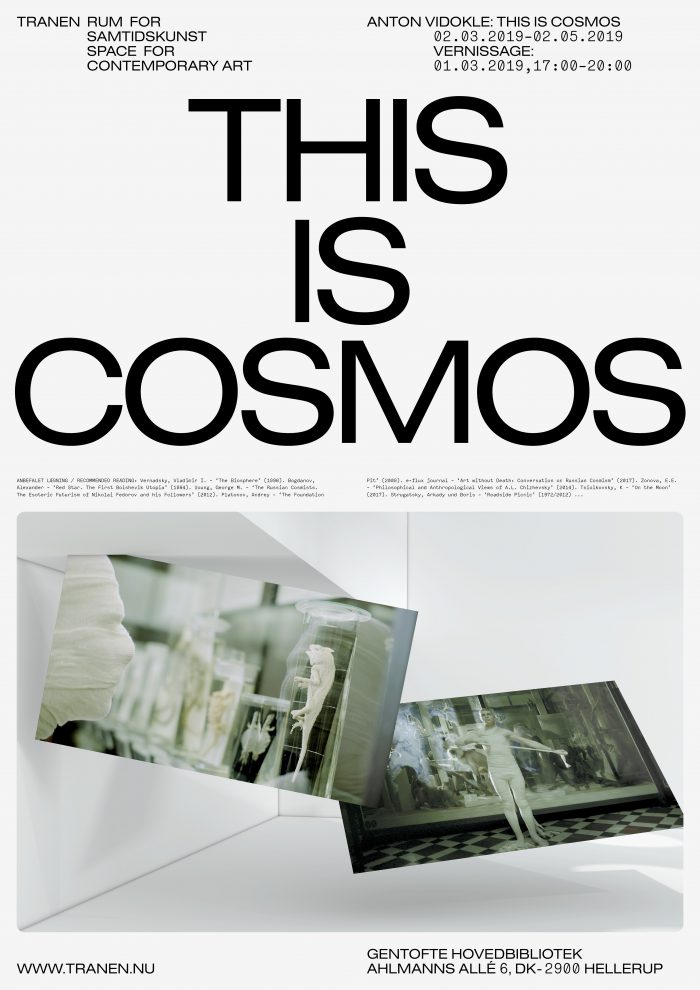Anton Vidokle
This Is Cosmos
02.03.2019–02.05.2019
Vernissage:
01.03.2019,17:00–20:00
TALK: ANSELM FRANKE & ANTON VIDOKLE:
29.03.2019,17:00–20:00
Døden er en fejl. Som konsekvens bør mennesket sigte efter evigt og interplanetært liv, foreslog den russiske filosof Nikolai Fedorov (1829-1903). Som kunstneren Anton Vidokle har opsummeret Fedorovs position i videoerne Immortality For All: a film trilogy on Russian Cosmism: “Fordi sand social lighed betyder udødelighed for alle […] må vi genoplive vor forfædre.” Og genoplivning af de døde nødvendiggør som en konsekvens heraf kolonisering af rummet hinsides en stadig mere befolket jord.
I film trilogien Immortality For All fra perioden 2014 til 2017 mediterer Anton Vidokle over en kulturel strømning i Rusland kaldet kosmisme. Federov, kosmismens faderfigur, er den første stemme, som Vidokle fremmaner fra fortiden. Fedorovs filosofi vandt indpas hos en kreds af intellektuelle i de sidste 25 år af hans liv, hvor han arbejdede som bibliotekar på Moskvas første offentlige bibliotek, der husede Moskvas første offentlige museum for en samling af malerier, tryk og manuskripter. Vidokles første separatudstilling I Danmark, This is Cosmos, udspiller sig ligeledes på et offentligt bibliotek, der huser en kunstinstitution, Tranen. Udover videotrilogien præsenterer udstillingen en tidslinie over russisk kosmisme udarbejdet sammen med Anastasia Gacheva og Arseny Zhilyaev samt et lille bibliotek med kosmistisk litteratur. Vidokles arbejde i rummet mellem kunstrum og bibliotek genkalder Fedorovs overvejelser over foreningen af bibliotek og museum: “Hvis et depot kan sammenlignes med en grav, så er læsning […] en form for opgravning, imens en udstilling er […] a genopstandelse.”
Som tidslinien bevidner, så har Fedorovs ideer – der med forfatteren Leo Tolstoys ord ikke er “så sindsyge som de lyder” – været meget indflydelsesrige. Ikke desto mindre udgav Fedorov næsten ingen af sine skrifter selv. Istedet har andre så som Vidokle og hans publicistiske platform e-flux udgivet dem postumt. Fedorovs arv lever videre i Dostoevskys romaner, i Malevichs malerier, i Tarkovskys film, I den banebrydende raketvidenskabsmand Tsiolkovsky, måske endda i opførelsen af Lenins Mausolæum osv.
Med sin trilogy tilslutter Vidokle sig imidlertid ikke nødvendigvis denne følgerække. Han er hverken discipel eller kritiker for den sags skyld. Hans film er snarere en slags visuelle, mundtlige og musikalske variationer over kosmistiske skriverier i grænselandet mellem dokumentar, essay, poesi og højtlæsning.
Vidokles arbejde vil givetvis blive set set I lyset af diverse private, offentlige og videnskabelige projekter, der slægter kosmismen på, så som kolonisering af Mars, genoplivning af døde og uddøde organismer, omvendt aldring, blodtransfusion og klima-engineering. Tyngdepunktet i Vidokles trilogi er imidlertid ikke en journalistisk historie om anvendt kosmisme i det 21. århundrede. Vidokle søger snarere at genantænde det spekulative og eksperimentelle potentiale i de kosmistiske projekter, som stadig er på kant med verden af idag og fortsat udvider og forstyrrer vores forestillingsevne og verdensbillede. Selvom filmene skudt på locations i Rusland og det forhenværende Soviet Unionen gør brug af visse koder kendt fra dokumentarfilm, er filmene ikke så meget dokumenter over kosmismen og de spor den har efterladt sig. Filmene søger snarere at fremkalde og fremmane den påny.
Alle tre film reciterer og reflekterer ikke blot over kosmistiske tænkere. De inviterer også folk – både dem, som ser filmene og dem, som man kan se i filmene – til at udsætte sig selv for forskellige eksperimenter. Den første film, This is Cosmos, præsenteres som ”en bestrålingsseance” med ”terapeutiske virkninger.” Den anden film, The Communist Revolution Was Caused By The Sun, rummer både klinisk hypnose anvendt til afvænning og en geniscenesættelse af videnskabsmanden Chizhevskys eksperiment med virkninger af negativt og positivt ladet luft på biologiske organismer. Den tredje film, Immortality and Resurrection for All!, bruger eksperimentel terapi med en speciel flimmer-effekt brugt til at kurere hukommelsestab.
I anledning af This is Cosmos har Tranen indgået partnerskab med Aarnio Originals. I interiøret svæver tre skærme og tre Bubble Chairs, så kunstværkerne og deres publikum svæver side om side i luften. Den finske designers ikoniske stole fra 1968 inviterer publikum til at fordybe sig i deres egen boble, imens de udstilles som deltagere i en kosmistisk oplevelse.
Udstillingen er kurateret og designet af leder Toke Lykkeberg.
Anton Vidokle (1965, RU) lever og arbejder i New York og Berlin. Han er grundlægger af udgivelses-platformen e-flux kendt for projekter så som e-flux video rental, e-flux journal og et udstillingssted i New York. Film fra trilogien “Immortality For All: a film trilogy on Russian Cosmism” er blevet vist på adskillige museer så som Centre Pompidou, Paris (2016) og Tate Modern (2017) samt en række festivaler og biennaler, herunder Shanghai Biennale (2014), d. 65. Berlinale (2015) og d. 7. Gwangju Biennale (2016).
TRANENS UDSTILLINGSPROGRAM
This is Cosmos er tredje udstilling I Tranens aktuelle program. Fokus er på den del af samtidskunsten, som ikke er enøjet fokuseret på samtiden. Når alt fra klima til teknologi udvikler sig med stadig højere hastighed, bliver samtiden flygtig og skrumper. Til gengæld vokser konstant vor viden om fortiden og spekulationer om fremtiden. Som del af denne bevægelse er megen samtidskunst ikke længere kontemporær, hvilket bogstaveligt talt vil sige ’med tiden.’ I stedet er den ’ekstemporær’, altså ’ude af tiden’. Over en periode på to år vil Tranen give plads til at tænke tid og historie i et anderledes og større perspektiv.
TALK MED VIDOKLE OG FRANKE
En talk mellem Anton Vidokle og curator Anselm Franke tager afsæt i Fedorovs tanker om museet og biblioteket for at diskutere sådanne offentlige institutioners rolle og væsen. Anselm Franke er Leder af Visuel Kunst og Film på Berlins Haus der Kulturen der Welt, der I 2017 præsenterede udstillingsprojektet Art Without Death: Russian Cosmism. …
Death is a mistake. Instead, propounded the Russian philosopher Nikolai Fedorov (1829–1903), mankind should aim for eternal and interplanetary life. As artist Anton Vidokle sums up Fedorov’s position in his Immortality For All: a film trilogy on Russian Cosmism: “Because true social equality means immortality for all […] we must resurrect our ancestors.” And, as a consequence, resurrection of the dead necessitates colonization of space beyond an evermore populated planet Earth.
Russian artist Anton Vidokle’s film trilogy Immortality For All, released between 2014 and 2017, revisits Russian cosmism, and its founding figure, Fedorov, is the first voice Vidokle revives from the past. The philosophy of Fedorov gained ground among a circle of fellow intellectuals in the last 25 years of his life, while he was working as a librarian at Moscow’s first public library housing Moscow’s first public museum, which included paintings, prints, manuscripts and more. Vidokle’s first solo exhibition in Denmark, This is Cosmos, likewise plays out at a public library housing an art institution, Tranen Space for Contemporary Art. Apart from the video trilogy, the exhibition presents a timeline of Russian cosmism developed in collaboration with Anastasia Gacheva and Arseny Zhilyaev, as well as a small library of Cosmist literature. Vidokle’s investment in the flow between art space and library echoes Fedorov’s appraisal of the unification of library and museum: “If a repository may be compared to a grave, then reading […] is a kind of exhumation, while an exhibition is […] a resurrection.”
As the timeline attests, Fedorov’s ideas—which are not, as the author Leo Tolstoy put it, “as insane as it seems”—have been hugely influential. Nevertheless, Fedorov almost didn’t publish any of his own writings. Instead, many others, most recently Vidokle and his publishing platform e-flux, have done so posthumously. His legacy lives on in the writings of Dostoevsky, the paintings of Malevich, the films of Tarkovsky, the pioneering rocket science of Tsiolkovsky, maybe even in the construction of Lenin’s Mausoleum, to name just a few examples.
Vidokle’s films, however, are not exactly part of this lineage. They are not the work of a follower, nor the work of a critic. They are rather visual, verbal, and musical variations on cosmist writings at the intersection of documentary, essay, poetry, and reading session.
The backdrop to Vidokle’s work might be current private, public, and scientific efforts aimed at realizing cosmist-like ideas about colonizing Mars, resurrecting dead or extinct organisms, reversing aging, transfusing blood and engineering the climate. The interest of Vidokle’s trilogy is however not a journalistic story about applied cosmism in the 21st century. Instead Vidokle seeks to reignite the speculative and experimental undercurrents in cosmist undertakings and thoughts, which are still at odds with the world and continue to expand and trouble our imagination and worldviews. While the films, shot on various locations in Russia and the former Soviet Union, make use of certain codes dear to documentary filmmaking, they do not so much document cosmism and its repercussions on site. Rather, they try to evoke it.
All three films do not simply recite and reflect on cosmist thinkers. They also invite people—those who appear in the films as well as those who watch them—to expose themselves to various experiments. The first film, This is Cosmos, presents itself as “an irradiation session” with “therapeutic effects.” The second film, The Communist Revolution Was Caused By The Sun, includes both a clinical hypnosis script used to quit addictions and a restaging of scientist Chizhevsky’s experiment in the effects of negatively and positively charged air on biological organisms. The third film, Immortality and Resurrection for All!, toys with experimental therapy involving a special flicker effect used to treat deterioration of memory.
For the occasion of This is Cosmos, Tranen has partnered with the producer Aarnio Originals. In the interior, three monitors float alongside three bubble chairs, leaving visitors and art works suspended in mid-air. Finnish designer Eero Aarnio’s transparent chairs from 1968 allow visitors to enter an immersive bubble of their own, while displaying the public as participants in a cosmist experience.
The exhibition is curated and designed by director Toke Lykkeberg.
Anton Vidokle (1965, Russia) lives and works in New York and Berlin. He is the founder of the publishing platform e-flux, which has sparked projects such as e-flux video rental, e-flux journal, and an exhibition space in New York. Films from “Immortality For All: a film trilogy on Russian Cosmism” have been shown at numerous museums, such as Centre Pompidou, Paris (2016) and Tate Modern (2017), and various festivals and biennials, including Shanghai Biennale (2014), 65th Berlinale International Film Festival (2015), and the 7th Gwangju Biennale (2016).
TRANEN´S PROGRAM OF EXTEMPORARY ART
This is Cosmos is the third exhibition in Tranen’s current program. Focus is on contemporary art that is not solely focused on our contemporary condition. When everything from climate to technology evolve with ever greater pace, the present becomes ephemeral and intangible. The present starts to shrink and becomes ever harder to grasp. Meanwhile, our knowledge of the past increases. Speculations about the future abound. And, as part of this movement, much art is no longer contemporary, i.e. literally “with time.” Instead, art is rather “extemporary,” i.e. “out of time,” and preoccupied by other and bigger temporalities than the present usually affords.
TALK WITH VIDOKLE AND FRANKE
The talk between artist Anton Vidokle and curator Anselm Franke will take as its starting point Fedorov’s appraisal of the museum-library for a discussion of the nature and role of public institutions such as cultural centers, art museums and libraries. Anselm Franke is Head of Visual Arts and Film at Berlin’s Haus der Kulturen der Welt, which hosted the exhibition project Art Without Death: Russian Cosmism in 2017.
Anbefalet læsning / Recommended reading:
Forfatter / Author
Titel / Title
Udgivelsesår / Publication date
Vernadsky, Vladimir I.
The Biosphere
1998
Bogdanov, Alexander
Red Star. The First Bolshevik Utopia
1984
Young, George M.
The Russian Cosmists. The Esoteric Futurism of Nikolai Fedorov and his Followers
2012
Platonov, Andrey
The Foundation Pit
2009
e-flux journal
Art without Death: Conversation on Russian Cosmism
2017
Zonova, E.E.
Philosophical and Anthropological Views of A.L. Chizhevsky
2014
Tsiolkovsky, K
On the Moon
2017
Strugatsky, Arkady und Boris
Roadside Picnic
1972
and more ...
...
2019
